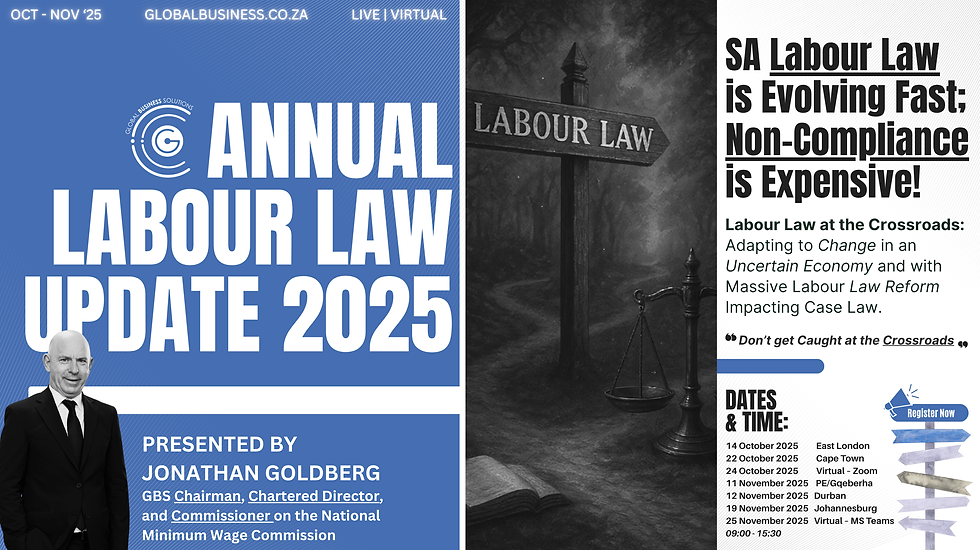DISMISSAL – OPERATIONAL REQUIREMENTS
- Jonathan Goldberg

- Sep 18, 2025
- 3 min read

A significant ruling, delivered on 29 August 2024, in the matter of UMICORE CATALYST SOUTH AFRICA (PTY) LTD V NUMSA AND OTHERS (PA3/23) [2024] ZALAC 37, the Labour Appeal Court (LAC) in Gqeberha upheld a judgment by the Labour Court (LC) declaring the dismissals of several employees by the employer to be substantively unfair.
The case centred on the use of a controversial selection method during a retrenchment process that followed the employer’s consolidation of its operations.
The employer, a manufacturer of catalytic converters, had acquired Delphi (Pty) Ltd and operated from two sites in Gqeberha. In 2015, it opted not to renew its lease at one of the sites and decided to relocate operations to one location. This restructuring rendered 52 positions redundant. During the consultation process prescribed by section 189A of the Labour Relations Act, the employer introduced a ‘laboratory assessment’ as a deviation from the agreed ‘last in, first out’ (LIFO) criterion in the laboratory department. This assessment was intended to measure behavioural competencies rather than technical skills.
NUMSA, acting on behalf of five affected employees, challenged the fairness of the dismissals. They argued that the behavioural assessment was subjective, aimed at removing higher-paid employees, and lacked agreement from the consultation process. Notably, four of the five employees refused to participate in the assessment, prompting the employer to proceed with scoring them based on management’s prior impressions and experiences.
The LC had sided with NUMSA, finding that the employer’s selection process lacked objectivity and that it had deviated from fair practices. The employer appealed the ruling, arguing that its operational needs justified the use of alternative criteria to ensure the retention of independently capable staff.
However, the LAC found that the behavioural assessment included questions that were inherently subjective and unrelated to core job performance. The questions often combined multiple concepts—like enthusiasm and productivity—and required speculative or opinion-based responses. Furthermore, panel members scored non-participating employees without written input or verifiable assessments, relying solely on memory and personal impressions.
The Court emphasised that in the absence of agreed selection criteria, any alternative method must be demonstrably fair and objective. The assessment used by the employer failed this test. The Court concluded that the company had not discharged its onus of proving the fairness of its selection method, rendering the dismissals substantively unfair. Consequently, the appeal was dismissed, and the reinstatement of the affected employees was upheld.
One of the reinstated employees had previously been unfairly dismissed and reinstated via arbitration. The employer placed him in a vulnerable position in a department undergoing retrenchment instead of returning him to his original, unaffected role. The Court held that this amounted to an unjust manoeuvre that violated the spirit of the reinstatement order, and confirmed his dismissal was also unfair.
This case serves as a cautionary tale for employers relying on internally-developed assessments during retrenchment. Selection tools must be both agreed upon and demonstrably objective to withstand judicial scrutiny.
Join us at the Annual Labour Law Update. This year's theme is Labour Law at the Crossroads: Adapting to Change in an Uncertain Economy and with Massive Labour Law Reform Impacting Case Law. What you'll gain:
Master the Digital Transformation of Labour Law in 2025
200+ Labour Law Cases Unpacked by Jonathan Goldberg
Critical Updates on Upcoming Legislation & NEDLAC Amendments
Navigate Workplace Challenges from the Digital Era to Discrimination Laws

View our upcoming events: Upcoming Events, like Employment Equity Reporting, Social Media in the Workplace and another Pop-Up on the New Code of Good Practice on Dismissal.
*All workshops are offered as customised in-house training that can be presented virtually or on-site.
"Global Business Solutions (GBS)—Your Partner in Strategic HR Compliance"




Comments